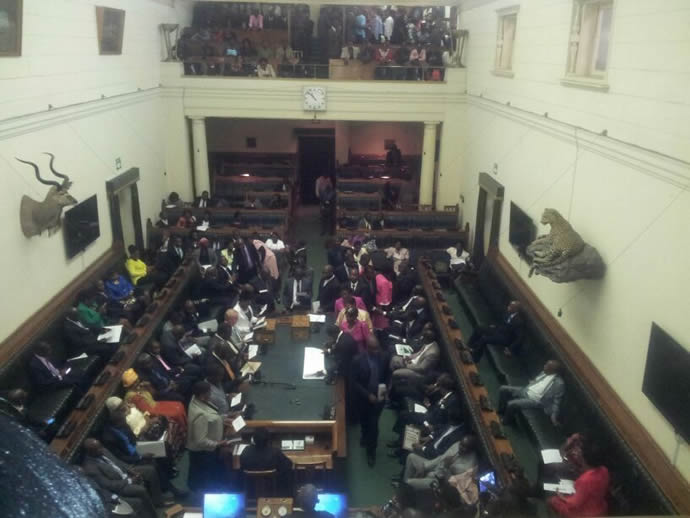Reprimand errant ministers

Zvamaida Murwira Mr Speaker Sir
THE decision by presiding officers to reprimand some errant Cabinet Ministers and their deputies who were not availing themselves to respond to questions in both the National Assembly and Senate is commendable. What now remains is whether they will heed the warning. National Assembly speaker Cde Jacob Mudenda and
Senate president Cde Edna Madzongwe stamped their authority as Parliament’s presiding officers when they chastised Cabinet ministers who did not come to field questions from backbenchers during the two Houses’ questions and answer sessions.
Cde Mudenda and Cde Madzongwe said Parliament would be left with no option but to invoke the requisite constitutional provisions and accompanying legal statutes to punish errant Ministers who fail to come to discharge their constitutional duties in responding to questions.
The presiding officers warned Cabinet Ministers and their deputies that they risked being charged with contempt of parliament as provided for by the Constitution; the Privileges, Immunities and Powers of Parliament Act and Standing Orders of Parliament.
This follows questions that remained unattended on the Order paper with no taker from the responsible ministry either by the minister or his deputy.
Backbenchers had on several occasions complained to presiding officers and the Leader of the House, Justice, Legal and Parliamentary Affairs Minister Emerson Mnangagwa that they were unable to raise questions affecting their constituencies and concerns because some ministers were not coming to respond to them.
In some instances, backbenchers would direct their questions to the Leader of the House in the absence of the responsible Minister who would in turn either give a generalised response or advise the backbencher to wait for a day when the responsible Minister would be in attendance.
Not only was the issue in respect of question and answer sessions that some ministers were not responding to but also motions or portfolio and thematic committee reports whose subjects fell within their jurisdiction.
In the end, backbenchers would wind their motions or reports in the Chamber without responses from the responsible minister frustrating efforts they would have made.
In winding their motions or committee reports Members of Parliament would bemoan the failure by the responsible minister to respond given the efforts many including researches would have been carried out.
To his credit Minister Mnangagwa has promised to implore his colleagues during Cabinet meetings of their obligation to attend parliament on Wednesdays and Thursdays for the question and answer sessions in the National Assembly and Senate respectively. The failure by Ministers had been a source of frustration for backbenchers considering the effort they put on motions and portfolio and thematic committee reports.
In their statements, the presiding officers said since the beginning of the First Session of the Eighth Parliament, they had seen a worrying trend.
Some Ministers and Deputy Ministers were prioritising other commitments to the detriment of the business of Parliament.
Consequently, most members’ motions had been on the Order Paper since last year.
The motions were not concluded because no responses were coming from the relevant Ministers.
In addition, a number of members’ questions were deferred for up to three months due to the continued absence of the relevant Ministers.
“I wish to remind Hon Ministers and Deputy Ministers, of the provisions of Sections 104 and 107 of the Constitution of Zimbabwe which states that: 107 (1) Subject to this Constitution, every Vice-President,
“Minister and Deputy Minister is accountable, collectively and individually, to the President for the performance of his or her functions.
“104 (1) The President appoints Ministers and assigns functions to them, including the administration of any Act of Parliament or of any Ministry or Department, . . .
“104 (2) The President may appoint Deputy Ministers to assist any Minister in the exercise of his or her functions.”
“107 (2) Every Vice-President, Minister and Deputy Minister must attend Parliament and Parliamentary Committees in order to answer questions concerning matters for which he or she is collectively or individually responsible,” read the statement made by the presiding officers.
“Even the most elementary interpretation of the above provisions of the Constitution, and Hon. Ministers have a capacity which is way above an elementary interpretation of the Constitution, reveals that Ministers and Deputy Ministers have an inescapable obligation to attend to their parliamentary duties as an integral part of the functions the President assigns to them.
“The presiding officers also quoted Section 119 (1) which provided that, “Parliament must protect the Constitution and promote democratic governance in Zimbabwe”, a constitutional mandate which he said everyone especially Ministers and Deputy Ministers, must take very seriously.
“The Chair would, therefore, like to serve notice to all Honourable Ministers and Deputy Ministers that the House will not allow this situation where some of them neglect their parliamentary duties to continue unabated. The House will reprimand Ministers and Deputy Ministers who persistently prioritise other duties above their parliamentary duties. The Chair wishes to further give notice that, should this not produce the desired effect, the House will be left with no option but to invoke other constitutional powers at its disposal, including Contempt of Parliament.
The Chair is, therefore, making an appeal to all Hon Ministers and Deputy Ministers to demonstrate respect and appreciation of their constitutional obligation in serving the nation through their parliamentary duties.”
Having made these warnings expectations are, therefore, high that question and answer sessions would be different from what they had been before.
The expectation is now that the front benches reserved for members of the Executive would be filled in anticipation of questions from backbenchers.
At this juncture and even from the reading of the statement by presiding officers it seems clear that it is not their intention to invoke drastic actions like charging members of the Executive for contempt of parliament.
It’s a provision that would be resorted to after all methods at the disposal of parliament have been exhausted.
Members of the Executive should have a paradigm shift and attend parliament on Wednesdays and Thursdays.
The good thing about it all is that most Ministries have Ministers and their deputies meaning both could agree who should go assuming the other is busy.
It is, therefore, everyone’s expectation that members of the Executive would play their part by attending Parliament to respond to issues as provided for by the law.









Comments